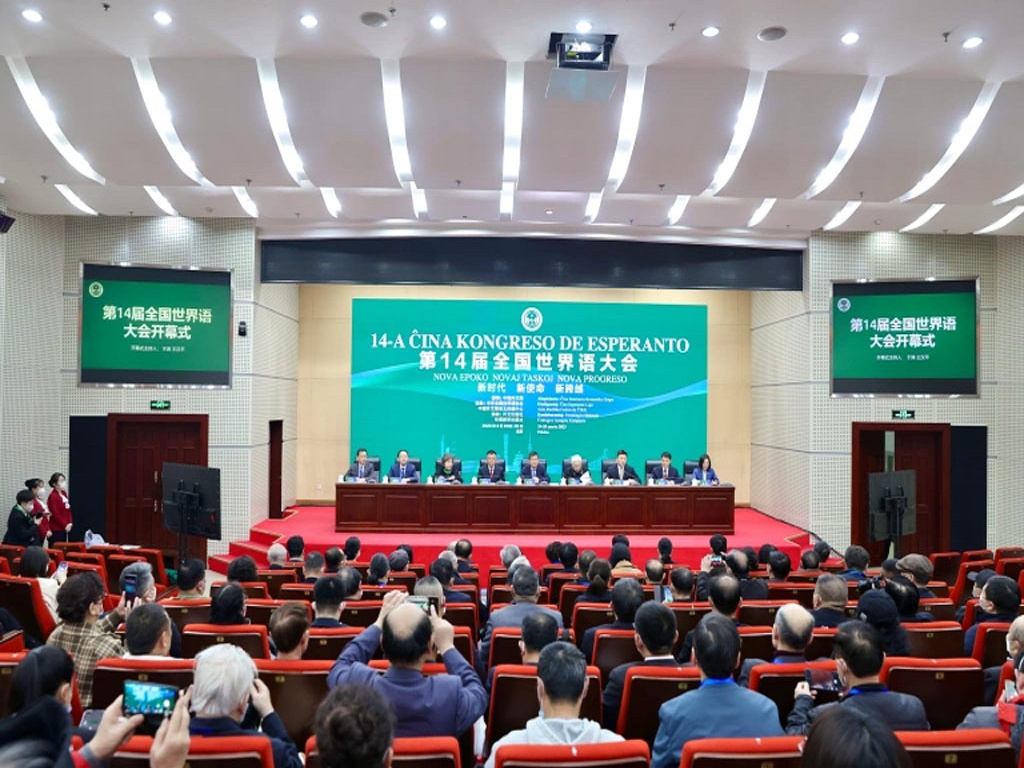The 14th China Esperanto Congress Held in Beijing

Supervised by China International Communications Group (CICG), organized by the China Esperanto League (CEL), and supported by the Foreign Languages Press and Sinolingua Co., Ltd., the 14th China Esperanto Congress was held in Beijing on March 25. Themed “New Era, New Mission, New Progress,” the meeting aimed to promote the spirit of the 20th National Congress of the Communist Party of China (CPC), pool the ideas of Chinese Esperanto speakers for future development, and take Esperanto work to new heights in the new era.
Distinguished guests attending the event included CICG President Du Zhanyuan, CICG Vice President Liu Dawei, CICG Vice President and CEL Vice President Yu Tao, former CEL President and current Principal Consultant Chen Haosu, and President of CICG Asia-Pacific Chen Wenge. More than 200 representatives from 16 provinces, municipalities, and autonomous regions across China attended the opening ceremony. Duncan Charters, President of the Universal Esperanto Association (UEA), addressed the meeting via video link. Organizations including the UEA, the International League of Esperantist Instructors, the Asia-Oceania Esperanto Association, the Japan Esperanto Institute, and the Korean Esperanto Association sent congratulatory messages.
Du Zhanyuan said in his remarks that Esperanto has served as a bridge to peace and played an important role in promoting friendship and mutual understanding between China and the rest of the world. He believes the language can make positive contributions to the building of a community with a shared future for mankind. Du also noted that the CEL and Esperanto speakers in China should put the overall interests of the country first, use Esperanto as a carrier to present China to the world, promote cultural exchange and mutual learning, pool resources for high-quality development, and stay devoted to youth education.
Duncan Charters applauded China’s achievements in promoting Esperanto education, the development of young talent, international youth exchange, and the relationship between the UEA and UNESCO. He said that such efforts provided an inspiring example for the UEA and Esperanto speakers in other countries, stressing that the theme of the meeting resonated with the current trend of global development as new means of communication are rapidly emerging. The UEA President expressed confidence that further progress would be made if new goals of Esperanto work were identified and achieved.
Chen Haosu said at the event that Esperanto was invented to promote human solidarity and world development by facilitating international communication—a noble ideal shared by the CPC. Proposed by the Party based on historical experience, the idea of building a community with a shared future for mankind inspires Chinese Esperantists to work harder. Chen urged Esperanto speakers in China to unite under the leadership of the CPC and join hands with the rest of the country to realize the great rejuvenation of the Chinese nation.
The 14th China Esperanto Congress approved a report on the work of the 10th CEL Council and adopted the Charter of the China Esperanto League, the Regulations on the China Esperanto League Membership, and the Regulations on China Esperanto League Membership Fee. A new CEL Council and a new standing council were elected at the meeting, with Liu Dawei elected as the new president. Members of the new council are from diverse sectors, which is conducive to the future development of the CEL.
Newly-elected CEL President Liu Dawei said in his speech that at a new historical point, the CEL is facing unprecedented development opportunities and has greater commitments to meet. He also called on concerted efforts to stay committed to the goals of the Esperanto work and explore new ways to bring the development of the CEL to a new level. Liu also briefed the overall objectives and major tasks of the CEL in the next step and stressed the importance of political awareness, talent development, innovation, rules-based management, and the self-building of Esperanto leagues at national and local levels.
During the event, individuals and organizations that made outstanding contributions to the promotion and development of Esperanto between 2020 and 2022 were rewarded, the first meeting of the new CEL council convened, a joint meeting of the presidents and secretaries-general of local Esperanto leagues in China was held, and sub-forums focusing on Esperanto teachers, the young generation, and economics and trade were organized.
In his closing remarks, Chen Wenge noted that the 14th China Esperanto Congress featured sound top-level planning and a pragmatic and efficient work style, and that participants conducted in-depth discussions on the well-arranged agenda in a friendly and warm atmosphere. CICG Asia-Pacific, as the administrative body of the CEL, will strive for new achievements in the Esperanto work in the new era, he declared.
Convened every two years, the China Esperanto Congress is committed to enhancing understanding, solidarity, and friendship among Esperanto speakers, sharing experience in the Esperanto work, improving the Esperanto proficiency of the CEL members, enhancing language research and academic exchange, and fostering cultural exchange between China and other countries.
Esperanto is an artificial language developed in 1887 by Dr. L.L. Zamenhof, based on the Indo-European languages. His goal was to eliminate language barriers in international communication and promote world peace. Esperanto has now become the world’s most widely used international auxiliary language, and more than 150 countries and regions around the world have Esperanto organizations and speakers. The UEA has established consultative relations with UNESCO.
The Esperanto movement in China made important contributions to the country’s anti-fascist campaign. After the founding of the People’s Republic of China in 1949, the movement played an active role in China’s modernization drive. Founded on March 11, 1951, the CEL is responsible for planning, coordinating, contacting, serving, and guiding the country’s Esperanto work. Esperantists of previous generations including Hu Yuzhi, Ye Laishi, Chen Yuan, Tan Xiuzhu, and Chen Haosu have successively served as the CEL president. The league organized the 71st and 89th World Esperanto Congress in 1986 and 2004, respectively, through which it showcased China’s achievements in reform and opening-up and facilitated cross-border cultural exchange.
